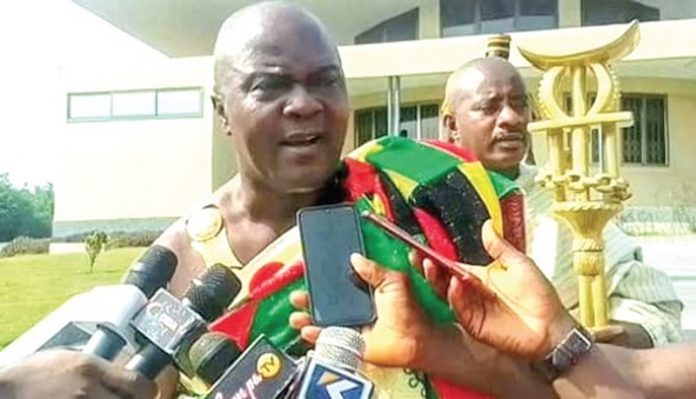The Central Regional House of Chiefs (CRHC) has given a clean bill of health to the first lithium mining licence the government issued to Barari DV Ltd, a subsidiary of Atlantic Lithium.
The traditional rulers said although the deal was not a perfect one, they were convinced by the explanation given by the Minerals Commission and the Ministry of Lands and Natural Resources that the agreement would immensely benefit the country.
The President of the CRHC, Odeefo Amoakwa Buadu VIII, said the official position of the House was arrived at after a crunch meeting with a Deputy Minister of Lands and Natural Resources, George Mireku Duker, and some officials of the Lands Ministry and the Minerals Commission last Friday.
The delegation included the Chief Executive Officer (CEO) of the Minerals Commission, Martin Ayisi; the Advisor on Mines to the Minister, Benjamin Aryee; the Central Regional Minister, Justina Marigold Assan; the Vice-Chancellor of the University of Mines and Technology (UMaT), Prof. Richard Kwasi Amankwah.
The meeting, which lasted for more than four hours, saw Mr Duker make a presentation on the nitty-gritty of the lithium agreement with Barari DV.
Among other things, the deputy minister’s presentation touched on the royalty regime of 10 per cent; 13 per cent free carried interest; 35 per cent corporate tax; requirement for the company to list on the Ghana Stock Exchange; as well as the one per cent development fund for the host communities.
The chiefs took turns to peruse the provisions of the lithium mining agreement and raised concerns, which were subsequently clarified by Mr Duker and the CEO of the Minerals Commission.
Declaration of support
Shortly after the meeting, Odeefo Buadu VIII told the media that the decision by the CRHC to support the agreement was because the house saw the discovery of lithium in the region as a blessing so the resource must be exploited to the benefit of the people.
“We are not going to wait until lithium prices become so low before we take a decision to allow it to be mined.
We have to take a timely decision on it; so we decided that it should be mined to the advantage of our people,” he said.
The CRHC president added that since lithium was a new mineral to the country, it would come with new challenges and that it was not possible to get everything right before it was exploited.
Touching on the call by some civil society organisations (CEOs), think tanks, statesmen and women as well as religious leaders for the agreement to be put on ice and renegotiated, he said that position was not the best because there was evidence that the current lithium agreement was better than existing licences in the mining sector.
“If I say it is perfect, I may not be saying the truth, but as we have it now, there is enough reason to move ahead with the agreement to take advantage of the opportunities in it.
Perfectionists always delay, but we cannot do so; let us move ahead and mine the lithium and if there are challenges, we come together and try to resolve them,” he said.
He added that although the CSOs and other critics of the lithium agreement had varying reasons for disagreeing with the deal, the CRHC believed it was good based on the engagements they had from the Lands and Natural Resources Ministry and the Minerals Commission.
“They have explained everything to us, and we believe that it may not be perfect but it is far better than the mining agreements that we have now.
So, for us as chiefs, we want to take advantage of the opportunity now to ensure that we mine lithium as early as possible so that our people can benefit from it,” he said.
Odeefo Buadu VIII also said the CRHC was in favour of the lithium mining agreement because it had a huge potential to create jobs and boost the local economy.
Major hurdle cleared
Mr Duker described the decision of the CRHC to support the lithium agreement as a major move towards mining lithium in the country.
“The chiefs unanimously agreed that they are in support of the lithium agreement and, for that matter, the production of lithium. If our chiefs, who are the custodians of the land are saying yes, we welcome the agreement and want our people to have jobs, that is the biggest hurdle that has been cleared.
He added that going forward, the Lands Ministry and the Minerals Commission would deepen engagement with other stakeholders, especially the host communities, and make each aspect of the transition transparent for them.
Regarding the timeline for ratifying the agreement in Parliament, he said following the endorsement of the agreement by the chiefs, the parliamentary processes would be made easy.
For her part, Ms Assan commended the CRHC for throwing its weight behind the government in the matter of the lithium mining agreement and urged the house to be more involved in the management of the country’s natural resources.
She also underscored the need for the chiefs to ensure that the mining of minerals did not destroy their environment.
I haven’t seen my daughters in four years – Funny Face cries
Government procures 12 modern trains from Poland
The court won’t enforce a contract that promotes sexual immorality – Amorkor Armah

